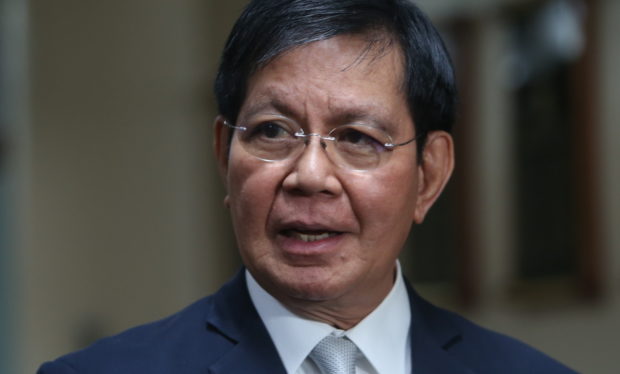‘Huge underspending’: Lacson flags P63B unspent Bayanihan 2 funds
MANILA, Philippines — Senator Panfilo Lacson on Monday bared an underspending of Bayanihan 2 funds amounting to P63 billion, two days after he was “wrongfully” accused by President Rodrigo Duterte as among the senators claiming of government underspending.
Bayanihan 2, or more formally known as the Bayanihan to Recover as One Act (Republic Act No. 11494) was enacted in September 2020 granting the President additional authority to combat the COVID-19 pandemic in the Philippines, and which aims to provide government funds to stimulate the economy while strengthening the health sector and the government’s pandemic responses.
Citing latest data from the Department of Budget and Management (DBM), Lacson said that of the P205.117-billion alloted under the Bayanihan 2, agencies incurred an obligation of P187.844 billion, or an obligation rate of 91.58 percent.
However, only P141.447 billion was disbursed, for a disbursement rate of 75.30 percent and 24.7 percent has not been disbursed, Lacson noted.
“We should keep in mind that underspending is determined not by fund releases but by obligations and disbursements. And based on my research, is there underspending? Yes!” Lacson said in a radio interview.
Article continues after this advertisement“This can be considered huge underspending with P46.397 billion undisbursed and P17.273 billion unobligated,” the senator added.
Article continues after this advertisementLacson arrived with the said figures when he researched the matter after Duterte, during a public address aired over the weekend, “wrongfully” tagged him as saying that the government underspent.
“Ang problema ko, may isa pa [I have another problem]. I keep hearing Senators Lacson, if I’m not mistaken, I forgot the others, Sotto, that we are underspending sa [under] Bayanihan. Is this true?” Duterte had said.
During Monday’s address, Finance Secretary Carlos Dominguez III told the President that the DBM has already released a total of around P660 billion in COVID-19 funds.
The P660 billion includes funds under two Bayanihan laws as well as regular funds under agency budgets.
But Lacson explained that the release of the budget by the DBM to concerned agencies is “not a determinant of underspending” since the funds remain with the agencies and not yet to the intended beneficiaries.
“If the money was not fully disbursed, the affected Filipinos suffer because they are denied the aid meant for them… It is a disservice to many, to say the least,” he said.
Lacson said underspending should instead be based on obligations and disbursements.
“Releasing the funds is a step toward spending but it is not spending itself. Just because the DBM released the funds does not mean the funds are spent. If the implementing agencies that got the funds from the DBM are incompetent, the funds won’t reach the beneficiaries,” he further said.
“The bad thing is that Bayanihan 2 already expired last June 30. Those who were denied the funds will no longer get aid unless a new law can be passed,” he added.
Lacson further pointed out that such underspending of Bayanihan 2 funds had denied much-needed assistance to many Filipinos whose lives and livelihood were affected by the pandemic.
These include those undergoing the “online learning program” of the Department of Education, as well as public utility vehicle drivers.
